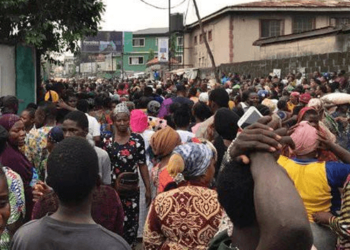In a bid aimed at becoming the dominant force in the oil and gas sector as well as achieving full monopoly in the supply of petroleum products in Nigeria, Dangote Refinery and Petrochemical Company Ltd has asked the Federal High Court in Abuja to stop the importation of refined petroleum products that are already being produced by the Refinery.
The case centred on the importation of refined petroleum products that Dangote Refinery claimed were already being produced domestically without shortages.
In the suit, Dangote Refinery is also demanding ₦100bn in damages from the Nigerian Midstream and Downstream Petroleum Regulatory Authority (NMDPRA).
The refinery alleged that the NMDPRA has unlawfully continued to issue import licenses to the NNPCL, Matrix Energy, and others for products like diesel and jet fuel, despite Dangote’s production capacity exceeding Nigeria’s current daily consumption of these products.
The defendants in the case include NMDPRA, NNPCL, A.Y.M Shafa Limited, A. A. Rano Limited, T. Time Petroleum Limited, 2015 Petroleum Limited, and Matrix Petroleum Services Limited.
In its originating summons, Dangote argued that the NMDPRA has violated sections 317(8) and (9) of the Petroleum Industry Act (PIA) by issuing import licenses under circumstances where no product shortfall exists.
The refinery contended that such licenses should only be granted when there is a demonstrated need for imported products.
The affidavit from Dangote Refinery Group stated that the import licenses issued to other companies are detrimental to Dangote’s business, which has invested billions of dollars into production. The company claimed that these actions have resulted in a lack of patronage for Dangote’s products.
The group alleged that NMDPRA has threatened to impose a 0.5% levy on Dangote’s wholesale transactions, which contravened statutory provisions that restrict such levies on transactions within free zones, arguing that the establishment of free zones aims to encourage competition and attract foreign investment.
Dangote’s legal team asserted that the situation necessitated judicial intervention to prevent ongoing violations of statutory provisions favouring certain entities over others.
The refinery sought an injunction to prevent the NMDPRA from issuing or renewing import licenses for the defendants.
Additional reliefs sought include general damages of ₦100 billion against NMDPRA, an order directing the NMDPRA to seal off all facilities used by the defendants for storing imported refined petroleum products, a declaration that as a registered free-zone enterprise, Dangote is exempt from all federal, state, and local government taxes, levies, and rates, a declaration that imposing additional levies on Dangote is contrary to various legislative acts, an order directing the NMDPRA to withdraw all import licenses issued to the defendants.
At Monday’s proceeding, Dangote’s legal team informed the court of ongoing discussions between the parties aimed at reaching a settlement. He requested an adjournment to facilitate these negotiations.
The presiding judge, Justice Inyang Ekwo subsequently adjourned the case to January 20, 2025, for the report.
The move is widely seen by industry stakeholders as part of Dangote’s strategy to create a monopoly for his refinery as well as make the pricing of petroleum products less competitive.
The plan by Dangote to use the court to stop the importation of petrol is also seen by industry watchers as an attempt by the Refinery to usurp the powers of the NMDPRA and other regulators.
This, according to stakeholders, is a contravention of the provisions of the Petroleum Industry Act 2021, particularly in the area of guaranteeing energy security, affordability, and accessibility.
Section 205 of the PIA provided that the government will no longer control the prices and supply of petroleum products such as kerosene, petrol, diesel, and LPG.
The Act stipulated that market forces (private sector players) will regulate the products through a competitive process under a willing buyer-willing seller arrangement.
This section of the law aims to attract private investments and create a competitive and efficient market that ensures the availability, affordability, and reliability of petroleum products.
The goal is to also ensure that citizens have reliable and affordable access to petroleum products.
Recall that in a bid to demonstrate its readiness towards buying petrol from Dangote Refinery Petrochemical Company Ltd, the NNPC Ltd had mobilised 500 trucks to the facility on September 15 this year.
The truck was to enable NNPC Ltd to lift petrol from the Dangote Refinery under the naira for crude sale arrangement.
Recall that the Federal Executive Council, under the leadership of President Bola Tinubu, had in July approved the sale of crude to Dangote and other local refineries in Naira and the corresponding purchase of petroleum products in Naira.
This initiative will help reduce pressure on the Naira, eliminate unnecessary transaction costs, and improve the availability of petroleum products in the country.
Since then, the implementation committee chaired by the Minister of Finance, Mr Wale Edun and the technical committee have worked intensely with NNPC Ltd and Dangote Refinery to fashion out the details of the modalities for the implementation of the FEC approval
Based on the agreement between Dangote and NNPC Ltd, the Refinery is to supply 25 million litres per day to NNPC in September, 30 million litres per day in October and 35 million litres per day in November.
This is expected to enable NNPC Ltd to guarantee energy security for Nigerians in line with the provisions of the PIA 2021.
However, the Dangote Refinery, has not been able to meet that commitment to NNPC Ltd in line with the terms of the agreement.
Investigations revealed that from the 400 million litres of petrol that Dangote Refinery ought to supply NNPC Ltd in September, only 103 million litres were delivered. This represents a paltry 26 per cent of the PMS demanded by the NNPC.
Findings further revealed that in October, Dangote Refinery PMS supply commitment to NNPC was 665 million litres out of which only 214 million litres have been met resulting in a shortfall of 78 per cent.
It was gathered that from September 15 when NNPC started lifting petrol from Dangote Refinery to October 20 this year, only 317 million litres of PMS has been supplied to the National Oil Company out of a total commitment of 1.065 billion litres of petrol.
Data analysed by this newspaper showed that the 317 million litres represent just 29.76 per cent of the PMS demanded by NNPC from the Dangote Refinery.
This, leaves a shortfall of about 748 million litres of petrol from Dangote Refinery that are yet to be supplied to NNPC Ltd.
The implication of this is that with Dangote’s undersupply of PMS to NNPC by 70 per cent, it may create an energy crisis for Nigeria if steps are not taken by the National Oil company to bridge the fuel supply gap through other sources such as petrol importation.
With the order of injunction being sought by Dangote Refinery stopping NMDPRA from renewing import licenses to companies to import petroleum products, experts have said the huge supply shortfall by Dangote Refinery will create fuel scarcity for Nigerians as well as lead to further hikes in the price of petrol by black marketers as demand will far outweigh supply.
Reacting to the development, Dangote said in a statement that the case is an old issue that started in June and culminated in a matter being filed on September 6, 2024.
He said, “Currently, the parties are in discussion since President Bola Tinubu’s directive on Crude Oil and Refined products sales in the Naira Initiative, which was approved by the Federal Executive Council (FEC).
“We have made tremendous progress in that regard and events have overtaken this development. No party has been served with court processes and there is no intention of doing so.
“We have agreed to put a halt to the proceedings. It is important to stress that no orders have been made and there are no adverse effects on any party.
“We understand that once the matter comes up in January 2025, we will be in a position to formally withdraw the matter in court.”










